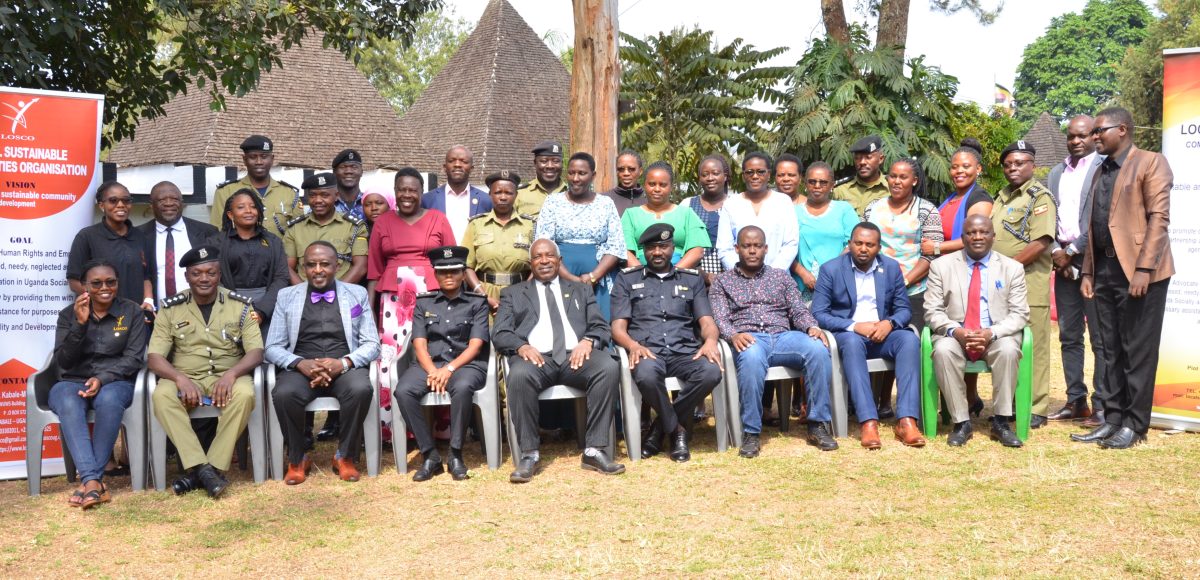
- July 30, 2024
- LOSCO
- 0 Comments
- Blog, News, Uncategorized
ADDRESS THE BARRIERS TO SRHR AND CURB TEENAGE PREGNANCIES AND MATERNAL MORTALITY IN UGANDA
LOSCO is a Human Rights Organization Operational in the Kigezi Sub region with a goal to Advocate for Human Rights and empower the distressed, needy, neglected and vulnerable population in Uganda Socially and economically by providing them with necessary assistance for purposes of self-sustainability and development through research and evidence generation, community empowerment and capacity building.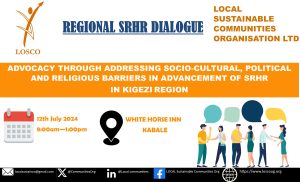
LOSCO has since 2019 been involved in SRHR policy Advocacy in partnership with other likeminded CSOs and Government Entities and recently with CEHURD under COPASAH Project in 2021 and with CSMMUA in 2022 and 2023 to embrace certain human rights that are already recognized in international human rights documents and national laws. All this geared towards attaining a minimum Sexual and Reproductive Health Package adopted from the 1994 ICPD in Cairo and developed in 1999 by Ministry of Health being a reflection of the national priorities.
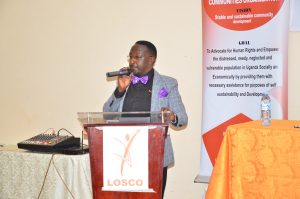 Human Rights Defenders and Activists in Kigezi called on religious leaders to adopt and promote comprehensive strategies to address the rising cases of teenage pregnancy and early marriages in the region. Organized by the Local Sustainable Communities Organization (LOSCO), the event attracted a diverse group of participants, including educators, religious and political leaders, police officers, and human rights defenders with over 90 participants for both meetings (male and female / 45:55 in percentage) inclusive in nature. The advocates highlighted alarming statistics showing a spike in teenage pregnancies and early marriages in the Kigezi Sub-Region, exacerbated by the COVID-19 pandemic with 1300 teenage pregnancies recorded in Kigezi annually.
Human Rights Defenders and Activists in Kigezi called on religious leaders to adopt and promote comprehensive strategies to address the rising cases of teenage pregnancy and early marriages in the region. Organized by the Local Sustainable Communities Organization (LOSCO), the event attracted a diverse group of participants, including educators, religious and political leaders, police officers, and human rights defenders with over 90 participants for both meetings (male and female / 45:55 in percentage) inclusive in nature. The advocates highlighted alarming statistics showing a spike in teenage pregnancies and early marriages in the Kigezi Sub-Region, exacerbated by the COVID-19 pandemic with 1300 teenage pregnancies recorded in Kigezi annually.
Sexual Reproductive Health and Rights is abroad term that encompasses various aspects of human sexuality, including reproduction, sexual health and rights. Despite significant progress in recent years there are several barriers that limit the advancement of SRHR in many parts of Kigezi region. Highlighted are some of the key barriers in advancement of SRHR in Kigezi subsist conspicuously. Some of them can be highlighted here as mentioning all would be a hard nut to crack.
“We are harassed, threatened as women rights defenders for advocating for SRHR advocates, especially women, can face threats, harassment, and violence for our activism. The human rights advocates often face strong opposition from religious and traditional leaders, particularly regarding children accessing sex education”. Revealed Ms. Florence Tumuheirwe, Executive Director of Kigezi Women in Development,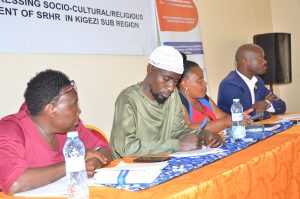
“Health facilities are dealing with the consequences of teenage pregnancies due to the community’s failure to prevent them. “The national teenage pregnancy rate has remained between 23% and 24% for the past 3-4 years. Kabale district, report an average of 1300 teenage pregnancies annually,” “Most of these are girls, who later drop out of school to become mothers, while others die during childbirth due to complications from unsafe abortions.” Dr. Gilbert Mateka, Kabale District Health Officer.
Legal and policy barriers were also discussed. Legal and policy have limited access to SRHR services. These barriers do include restrictions on access to contraception, abortion or other forms of family planning and even women’s ability to make decisions about their own bodies and reproductive health.
The religious restrictions also impact the advancement of SRHR. Some religions confessed to have strict teachings about sexuality and reproduction which can make it difficult to implement policies and programs to promote SRHR. For example, some religions prohibit the use of certain contraception or even may restrict access to family planning services. However, the top religious leaders often do not participate in these conversations and remain biased against SRHR services, paying little attention and also pose challenges to the advancement of SRHR through preventive measures. Therefore, the influential role of religious leaders in shaping community attitudes and behaviours.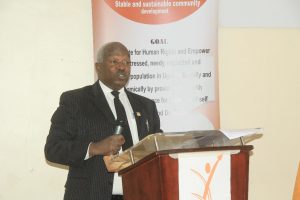
Politicians expressed the challenges they face in advocating against teenage pregnancies due to conflicting factors, such as the use of condoms and thus urged fellow politicians to invest in children’s future.
Deep-rooted cultural and social norms often stigmatize discussions around sexuality and reproductive health, making it difficult to openly address and provide information on SRHR. Cultural beliefs and practices can also pose challenges to the advancement of SRHR for instance some cultures have strong religious and spiritual beliefs that prohibit certain forms of contraception or reproductive health services. These beliefs can make it difficult to provide access to full range of SRHR options.
Many societies have deeply ingrained social norms and attitudes that can hinder progress in SRHR. Some cultures may view discussions of sexuality as taboo or may place a strong emphasis on traditional gender roles. These social norms make it difficult to implement policies and programs that promote SRHR.
The economic factors such as poverty and lack of access to affordable healthcare has also limited access to SRHR services. Many individuals particularly those in low- income societies, do not have the financial resources to access contraception, parental care and other essential SRHR services and are not able to afford costs associated with seeking the SRHR services.
Lack of enough education and awareness where comprehensive sexuality education and awareness campaigns is very much inadequate and this has hindered individuals understanding of their rights and access to SRHR services many people especially young people may not be aware of the importance of sexual health, contraception and reproductive rights or even may not know how to access these services safely and confidentially. “We are attacked for mentioning that inadequate or inaccurate sexuality education leads to misconceptions and lack of awareness about SRHR, which in turn hinders informed decision-making” said one of the participants.
Unhealthy family contexts. where exposure to unhealthy sexuality like pornography for all, are a deterrent, others are dysfunctional values in a family such as noisy sex by parents.
There is also limited access to healthcare services. Many individuals particularly in remote areas have limited access to those services due to geographical barriers, financial constraints and lack of trained healthcare providers. This usually results in limited access to contraception, parental care and other essential SRHR services.
Another challenge is the use of condoms where parents argue that whatever you pack for a learner going back to school is instrumental to the learner in their ordinary errands. Packing condoms looks like licensing them, permitting them, warranting them to put them to use. The elephant in the room; a matter that is deliberately ignored for the embarrassment it would cause, is NOT PACKING CONDOMS for them. The physiological pathways subsisting in the learners are inevitable and drive them wild. Encouraged condom or contraceptive use would promote immorality among teenagers thus emphasized prioritizing abstinence from fornication over other methods to reduce teenage pregnancies. Meanwhile, Drake Mutahakana, Secretary for Education of the Diocese of Kigezi, and Sheikh Abdul Hasib Sekalema, Head of Sharia at Kabale Muslim District Council, insisted. The opposition to the use of contraceptives in young girls, citing future health complications such as infertility, claiming they are unsafe was also expressed.
It was noted that also most advocates face a lot of stigma and discrimination when they mention that there are persistent gender inequalities, including unequal power dynamics in relationships and lack of women’s empowerment, often limit women’s ability to make choices about their own bodies and reproductive stigma and discrimination identified as another barrier for advancement of SRHR. Stigma and discrimination against certain groups such as LGBTQ individuals, people living with HIV/AIDs and those with disabilities can limit access to SRHR services. These individuals face discrimination, violence which has makes it difficult for them to access healthcare, education and other essential services.
IMPACT SO FAR REALISED
- The District Health Office have so far committed to provide access to a full range of SRHR options, including contraception, family planning services and reproductive health education at all levels using all the available awareness creation platforms. This will involve working with healthcare providers and community organisations to establish clinics and services that are accessible to all individuals regardless of their cultural or religious background. By providing access to a full a range of SRHR options it is possible to ensure that all individuals have the information and resources they need to make informed decisions about their reproductive health.
- The religious restrictions that had impacted the advancement of SRHR have been progressively eased through the right information packaging. Some religions confessed to have strict teachings about sexuality and reproduction which made it difficult to implement policies and programs to promote SRHR. They prohibited the use of certain contraception or even may restrict access to family planning services because of limited information and understanding. However, the top religious leaders will be encouraged to participate in these conversations to remove any bias against SRHR services. Therefore, the influential role of religious leaders in shaping community attitudes and behaviors will be equally strengthened.
- The majority of stakeholders especially the education sector committed to advocate and re- establish the comprehensive sex education policies and trainings for senior male and female teachers on the best practices concerning SRHR in schools, improved access to contraceptives and reproductive health services for adolescents, and fostering community engagement and emphasized the need for a multi-faceted approach involving education, access to reproductive health services, and community support to effectively tackle these challenges.
- Understanding the need for SRHR and the SDG3 through the consistent engagements, stakeholders acknowledged the need to advocate for legal and policy reforms that protect and promote SRHR and including access to contraception safe abortion and other forms of family planning. This they said can be achieved through supporting the development of National SRHR strategies and action plans to guide policy development and implementation and also collaborate with governments and other stakeholders to monitor and evaluate the impact of SRHR policies and programs and make evidence- based recommendations for improvement.
- The Office of the District Health, Education and Community Development are in the process of developing policies and programs that are respectful of diverse cultural and religious beliefs. This will involve working with religious leaders to develop policies that are consistent with religious teachings engaging in community outreach and education efforts to challenge harmful social norms and attitudes. By developing these policies and programs that are respectful of diverse cultural and religious beliefs it will be possible to create an inclusive and culturally sensitive approach to advancing SRHR.
WHAT CAN BE DONE DIFFERENTLY
Addressing these barriers requires a multi-faceted approach that involves governments, healthcare providers, Civil society organizations and individuals working together to promote SRHR and protect the rights of all individuals to make informed decisions about their own bodies and reproductive health, this may include strengthening healthcare systems, promoting comprehensive sexuality education challenging harmful cultural and religious norms and advocating for legal and policy reforms that protect and promote SRHR and many others as discussed below;
- All stakeholders emphasized the need for comprehensive sex education, improved access to contraceptives and reproductive health services for adolescents, and fostering community engagement and emphasized the need for a multi-faceted approach involving education, access to reproductive health services, and community support to effectively tackle these challenges.
- There is the need for community initiatives that address the root causes of teenage pregnancies and early marriages, such as poverty, lack of education, and cultural norms. And advocating for girls’ rights to education and equal opportunities to shift societal norms that perpetuate early marriages.
- CSOs to continue promoting measures to reduce teenage pregnancies despite interference from religious and cultural leaders. “He recounted his efforts in eradicating Female Genital Mutilation (FGM) in the Sipi Region before being transferred to Kigezi”. SP Ronald Mutungi, Kigezi Regional Police Legal and Human Rights Officer and also called for a unified effort to protect the girls, emphasizing the importance of preventive measures.
- Teenage pregnancies should not only be viewed as cultural, legal, or moral issues but also as threats to the lives and futures of the affected teenagers. Godfrey Bampabwiire, In-Charge of Muko Health Centre IV in Rubanda District, revealed that in seven months, he had performed caesarean sections on three girls who gave birth before their first menstrual periods.
- Religious leaders were asked to encourage open discussions about sexual health and the consequences of teenage pregnancies and early marriages within their congregations. “Religious leaders have a unique platform to influence positive change. If the abstinence they always preach is not effectively working out, incorporating other measures and factual information about reproductive health into their teachings can play a crucial role in protecting the future of our young children,”
- The advocates highlighted the importance of good parenting in preventing teenage pregnancies and early marriages and emphasized that parents play a crucial role in guiding and educating their children about the consequences of early sexual activity and the importance of staying in school
- The strong need to engage with religious and community leaders to challenges harmful norms and promote SRHR as a fundamental human right for example use community-based approaches to promote more dialogues and understanding about SRHR issues and also support the development of religious and cultural guidelines that respect and promote SRHR was emphasized.
- Provide access to a full range of SRHR options, including contraception, family planning services and reproductive health education at all levels including schools, health facilities, public spaces and worship centres. This may involve working with healthcare providers and community organisations to establish clinics and services that are accessible to all individuals regardless of their cultural or religious background. By providing access to a full a range of SRHR options it is possible to ensure that all individuals have the information and resources they need to make informed decisions about their reproductive health.
- There is need to engage in open and inclusive dialogue with stakeholders from a variety of backgrounds, including government officials, healthcare providers, community leaders. By involving these stakeholders, it is possible to better understand the specific challenges and barriers that must be overcame in order to advance SRHR. Thanks to LOSCO and her partners for this dialogue which has helped to identify potential solutions and strategies for addressing the social, cultural and religious barriers that are hindering the progress of SRHR.
- Both state and non-state actors as well as boundary stakeholders need to invest in community outreaches and education efforts to challenge harmful social norms and attitudes surrounding SRHR. This may involve developing educational materials and programs that promote SRHR and challenge harmful stereotypes and stigma. By engaging in community outreach and education efforts it is possible to challenge harmful social norms and attitudes and promote a more inclusive and accepting approach to SRHR.
- Develop policies and programs that are respectful of diverse cultural and religious beliefs. This may involve working with religious leaders to develop policies that are consistent with religious teachings engaging in community outreach and education efforts to challenge harmful social norms and attitudes. By developing these policies and programs that are respectful of diverse cultural and religious beliefs it is possible to create an inclusive and culturally sensitive approach to advancing SRHR.
- Implement comprehensive sexuality education programs in schools and communities to educate individuals about their rights and access to SRHR services. To train educators healthcare providers and community leaders to deliver SRHR education and awareness programs.
- Need to advocate for legal and policy reforms that protect and promote SRHR and including access to contraception safe abortion and other forms of family planning. This is through supporting the development of National SRHR strategies and action plans to guide policy development and implementation and also collaborate with governments and other stakeholders to monitor and evaluate the impact of SRHR policies and programs and make evidence- based recommendations for improvement. Engage policy makers and facilitate enactment of community laws and bye laws at local levels to advance accessibility. This can also be done at local group levels like Ngozi Groups.
- Implement policies and programs to reduce poverty and improve access to affordable healthcare and SRHR services. Use of economic incentives such tax credits to make SRHR services more affordable for individuals and families and also support the development of innovative financing mechanisms such as social health insurance or community- based health financing schemes to expand access to SRHR services in low- income settings.
- Have sexual moral programs and sensitization policies in the education sector introduced to provide sex education starting from the grass roots for example parents, senior women, teachers.
- Integrate the SRHR proposals from the government agencies for inclusive development. Policy makers need to fix time for sex education and also integrate sexual reproductive health services in all sectors. Commit to intentionally put it in all program areas. Integration of sexual health facilities and inclusion of VHT members and groups to provide sexual reproductive health services. All VHTs will be empowered to integrate SRH information and services in all services.
- Besides adopting sexuality education in schools to fight teenage pregnancies and their other immoral behaviors, will continue to ask parents to also do their roles of nurturing their children. “Besides adopting sexuality education in schools, the government should invest in the formation of Youth Friendly Corners in schools and health facilities where they can be told of the different dangers of early sex” Empower the young people in Human Rights Education to know their rights and access without limitation. There is an OVC Policy that should be enforced which also speaks into child policy.
- Whether you don’t want to talk about it, these are children, adolescents, when they grow up, they will explore. “We should be honest with our children as leaders and as parents, as church leaders and you tell them the truth” and therefore engage the religious leaders more in such conversations. We should tell religious heads such as the priests and sheikhs that there is no evil in telling a 12 years old child to abstain and if she cannot use protection. The Regional Police Commander SSP Saiga Ibrahim, emphasized.
- Promote cooperation with school heads and leaders to establish sexual education to students and introduction of sexual education and services clubs and dramas in the schools that will help in highlighting and educating sex education was also adopted by Education Office. Also encourage the need for improvement on health service providers for example employing social workers to provide psychological support to the young girls and parents at the health units and schools.
- To implement more community sensitization programs and Empowerment to sensitize parents and care takers on how and what to teach the young children on sexual reproductive health that is because “Charity begins at home” through both Health and Education sectors. Have the Local leaders encourage parents to take full responsibility to educate their children on sexual reproductive health to bring out the best morals with their children especially the boy child and menstrual hygiene and cycle. Also parents need to be good examples to their children on the code of dressing and reduce enticing of men out there.
- Intentionally follow through and Institute Health Clubs in schools that would facilitate peer to peer learning and overcome the information gaps in SRHR and also massively sensitize school administrators to start the role of educating children about sex and moral conduct.
Conclusion
Paying more attention to the matters of SRHR will empower us to avoid guesswork by instructing us to appeal to logic and common sense. This is what will elevate us to superlative heights of understanding. There is a mathematical certainty that concerted effort, tinged with a strong dynamism, will lend us frantic and vibrant spirits with a kinetic stamina to boldly approach SRHR issues squarely and clearly. It is now as bare as any child’s birth that advocacy through addressing socio-cultural and religious barriers in advancement of SRHR in Kigezi, and certainly in Uganda and Africa requires a concerted effort. Answers are tailored to measure well with given communities. One must put up with a section of the population that believes in myths and others who are netizens, the computer age fanatics. Their biology is one.
May the opinion leaders in conjunction with the authorities take advantage of fora, such as LOSCO, to pause and wonder; have a good reason to prescribe relevant interventions. It is now common knowledge that youths live like they have spare lives in astonishing lifestyles. It is an opportune moment to adequately infinite the intimate value of intervening now. It is time to echo collective sentiments for a people trapped in their own “wisdom” but actually yearning for tranquil. The most correct moment to part curtains from ostensibly contentious matters of SRHR is now. Roar against the detractors. To roar and stop, however, is worse than not roaring at all.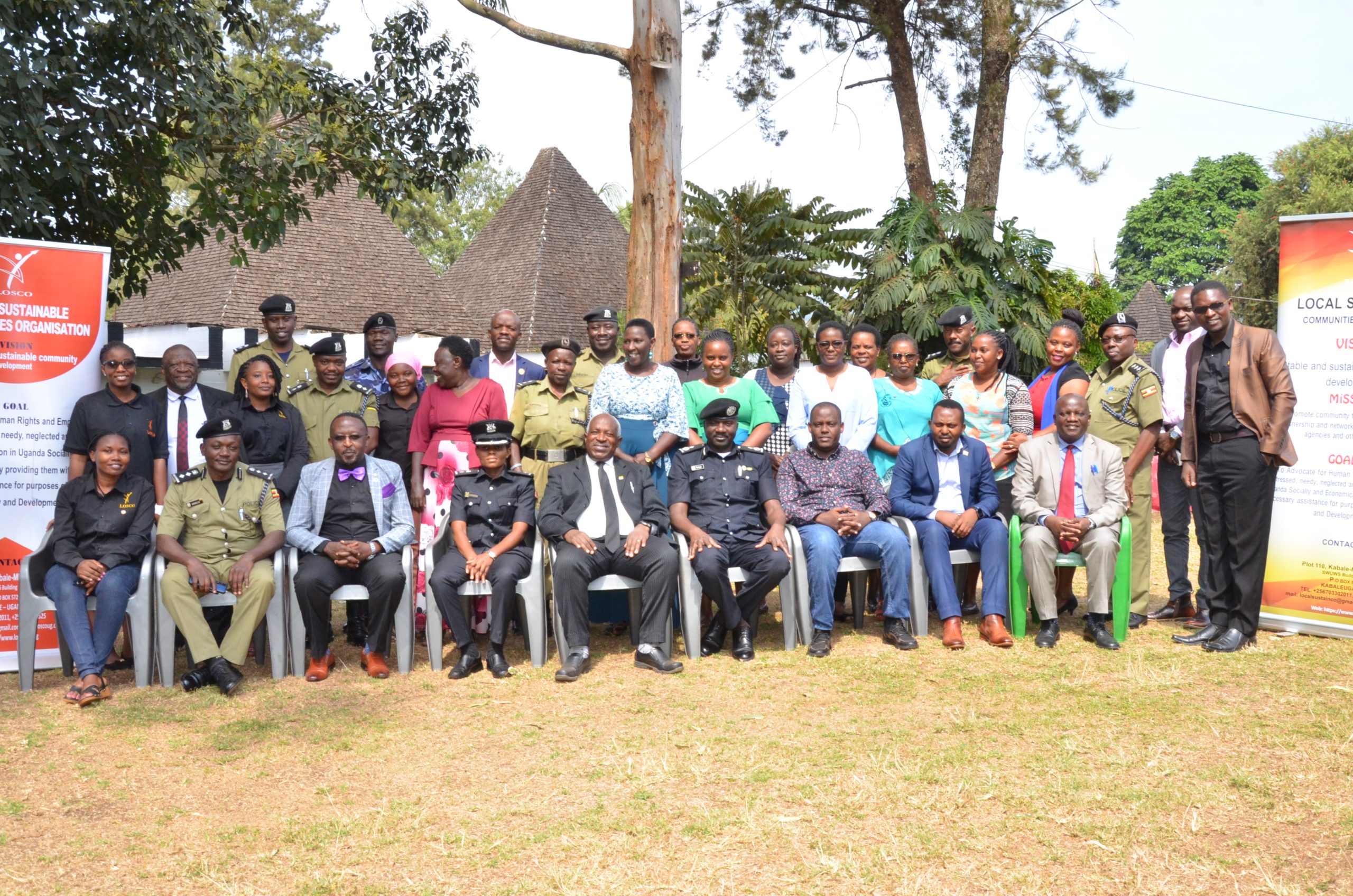
MEDIA LINKS
You Tube Link –
https://youtu.be/q9sbrNyDlq8?si=gjK7GJt9hF7QGjbw
The Source
Stakeholders Urge
The Source
Western Pearl News
Independent
Uganda Radio Network
https://ugandaradionetwork.net/a/story.php?storyId=238766
The Informer
NilePost
The Red Pepper
Chimp Reports
https://chimpreports.com/religious-leaders-faulted-for-sabotaging-anti-teenage-pregnancy-campaigns
SOCIAL MEDIA
https://x.com/CommunitiesOrg/status/1807400744665968716
https://x.com/CommunitiesOrg/status/1807407401236119838
https://x.com/CommunitiesOrg/status/1807408371542208661
https://x.com/CommunitiesOrg/status/1808110331845058634
https://x.com/CommunitiesOrg/status/1810605392797245503
https://x.com/CommunitiesOrg/status/1810946376546550252
https://x.com/CommunitiesOrg/status/1810949561193578635
https://x.com/CommunitiesOrg/status/1811633890638918136
https://x.com/CommunitiesOrg/status/1811667904108081367
https://x.com/CommunitiesOrg/status/1811668974339313682
https://x.com/KigeziTv/status/1811671728159953119
https://x.com/NiwamanyaSophan/status/1811673813035176404
https://x.com/CommunitiesOrg/status/1811633890638918136
https://x.com/Peakfm906/status/1811674918934741405
https://x.com/Vok895/status/1811681325994156261
https://x.com/gilbert_kags/status/1811677345486340573
https://x.com/CommunitiesOrg/status/1811690015539294255
https://x.com/CommunitiesOrg/status/1811696373378543937
https://x.com/CommunitiesOrg/status/1811698562645852424
https://x.com/CommunitiesOrg/status/1811703246546751850
https://x.com/Vok895/status/1811679851738280013
https://x.com/CommunitiesOrg/status/1811709156388196849
https://x.com/CommunitiesOrg/status/1812056559184118185


Leave a Comment
You must be logged in to post a comment.